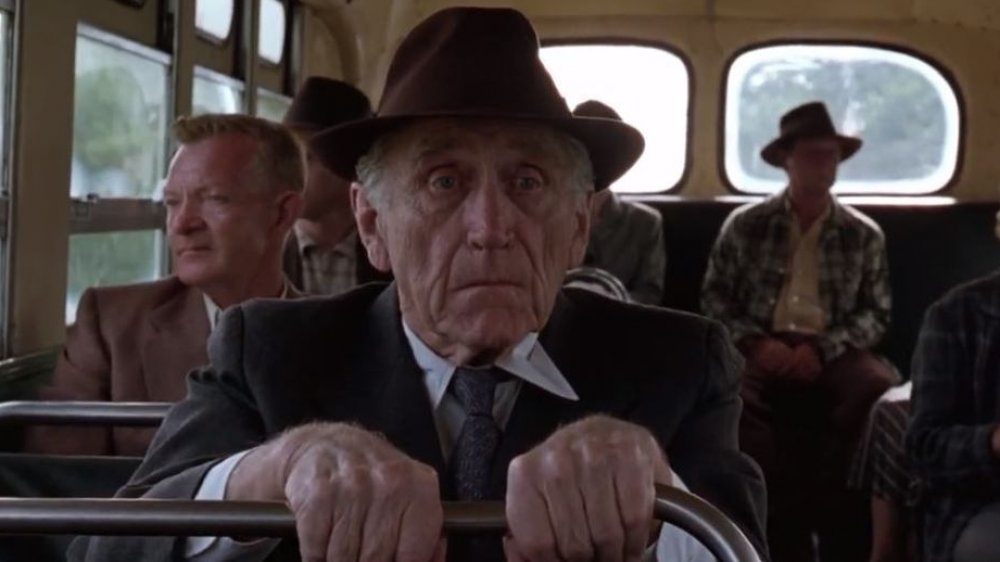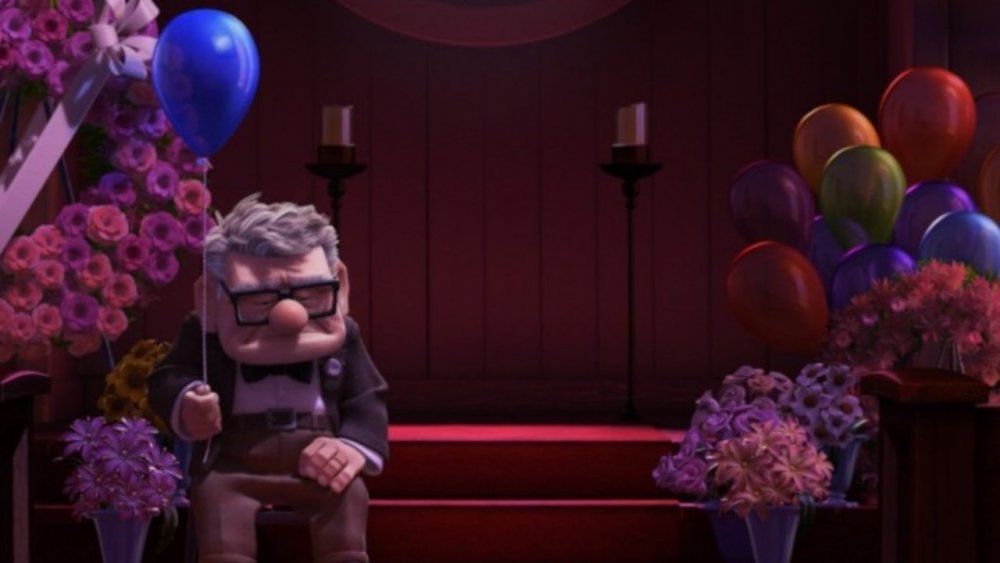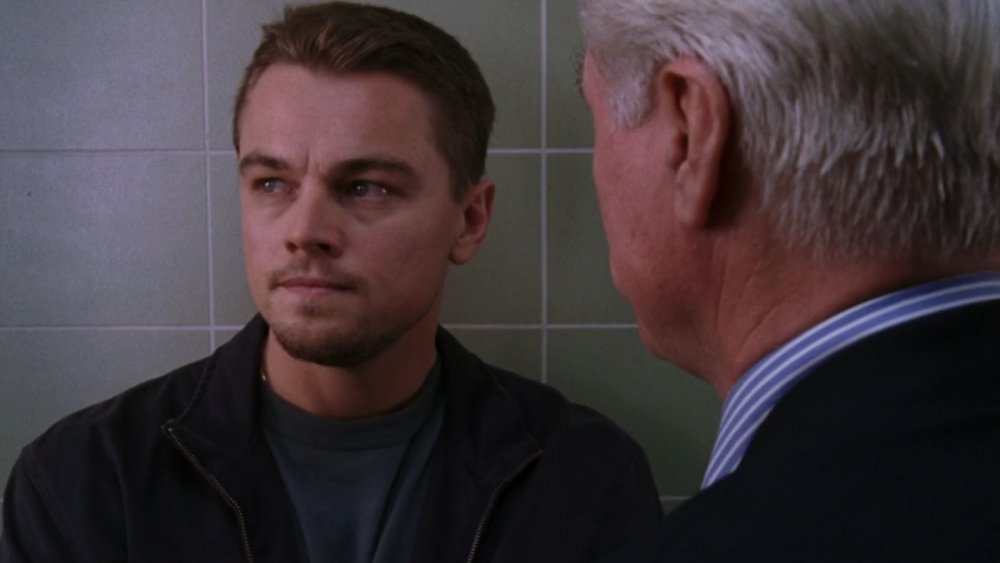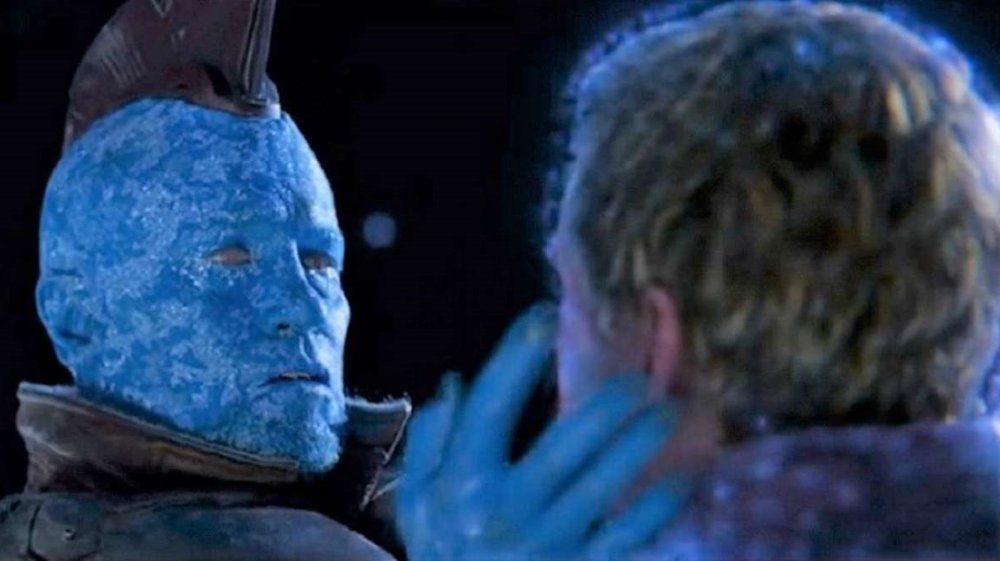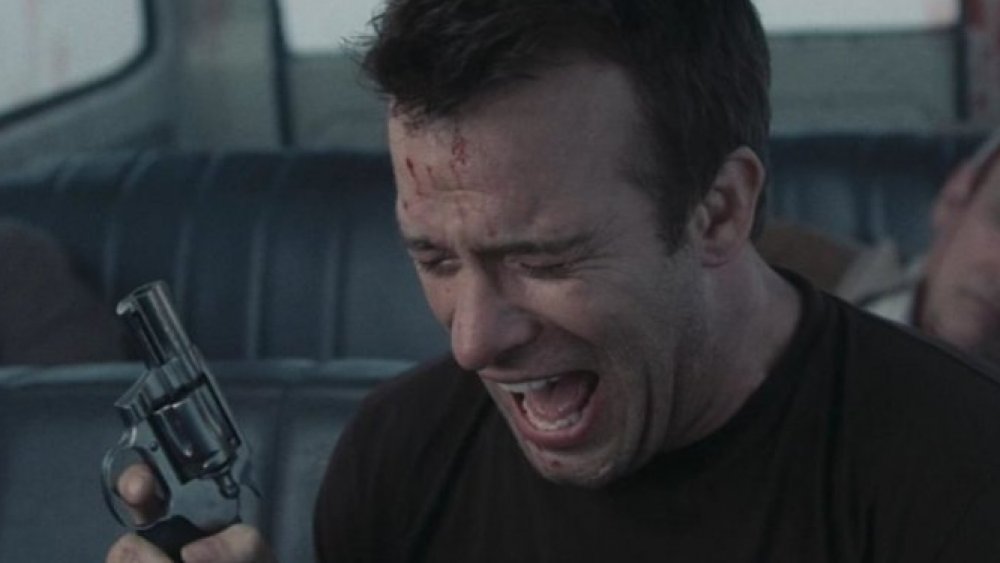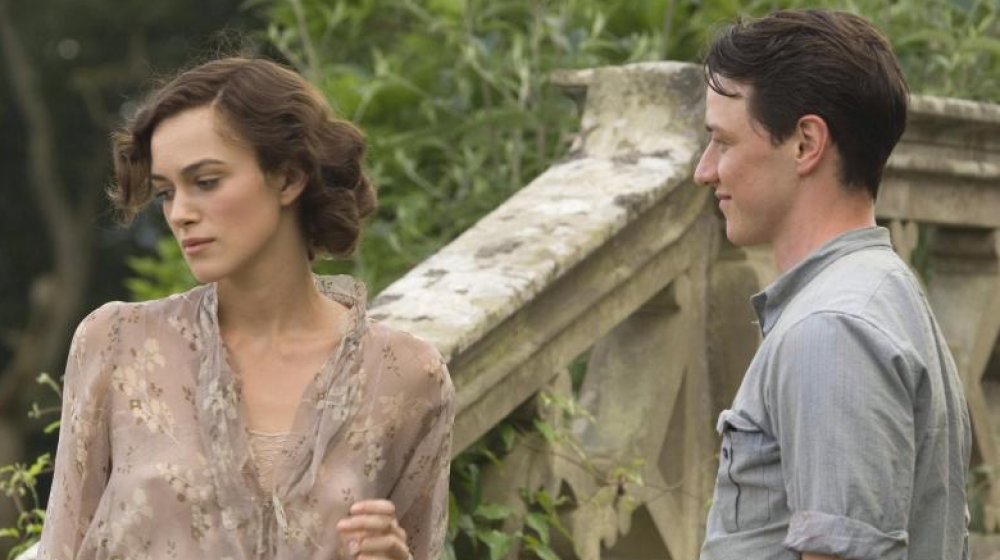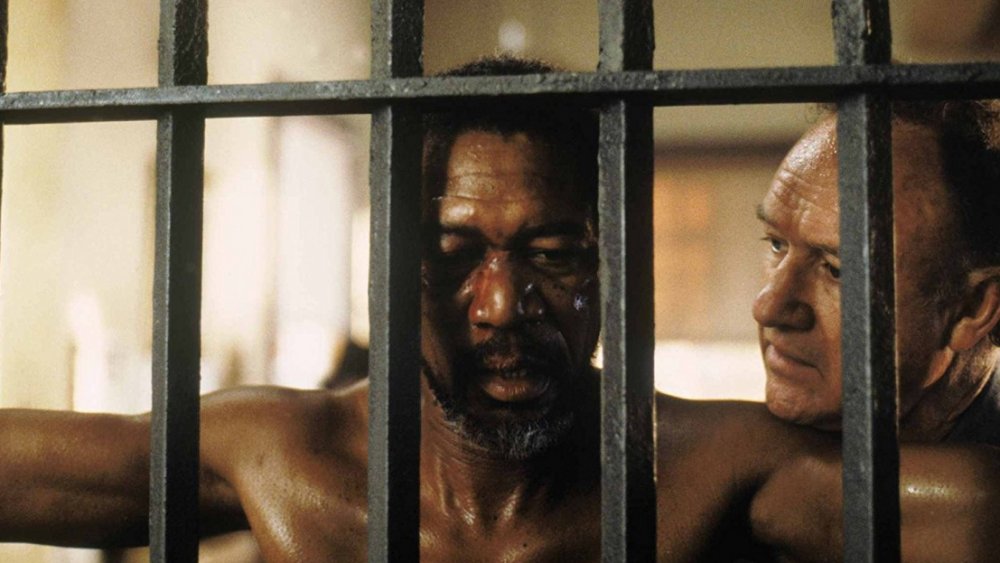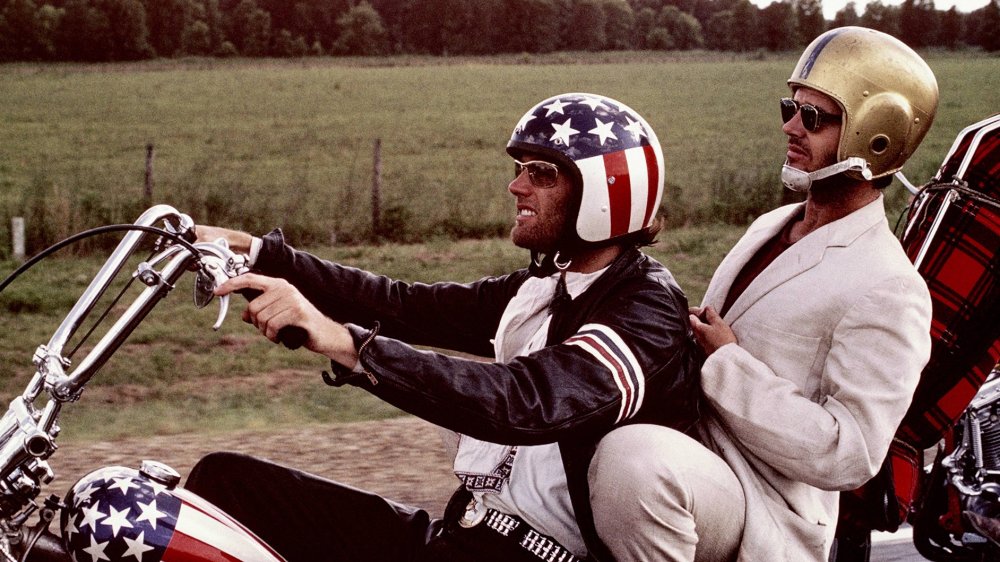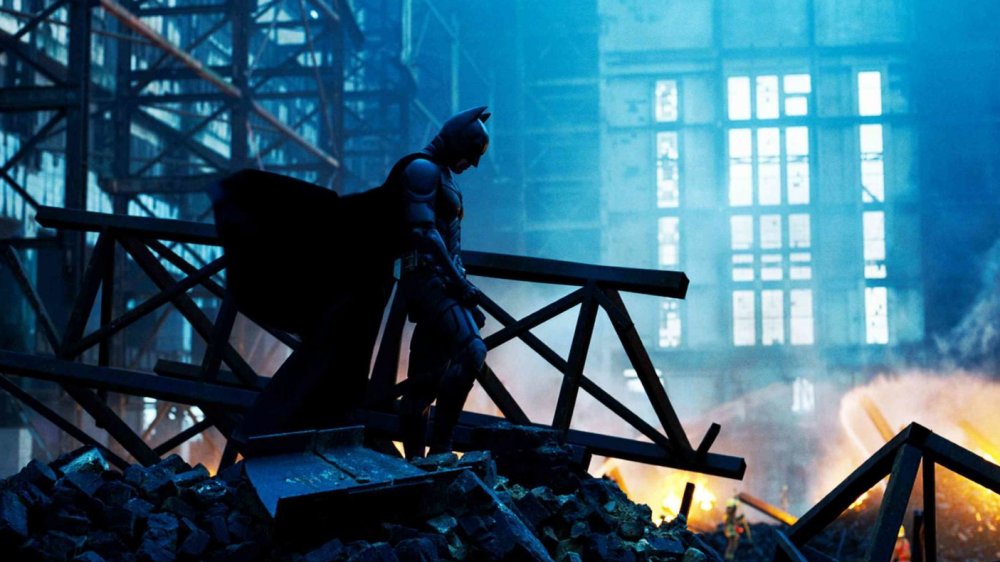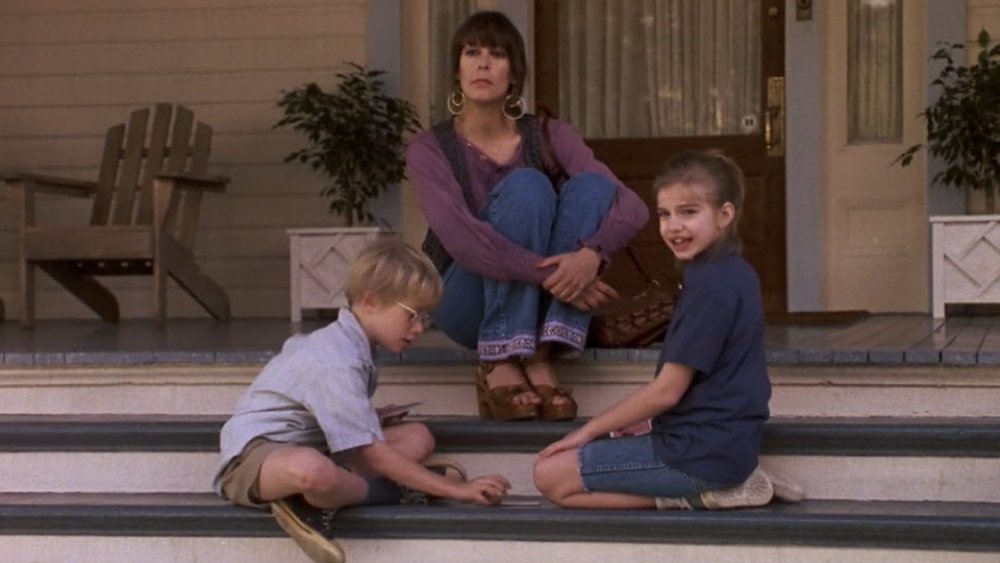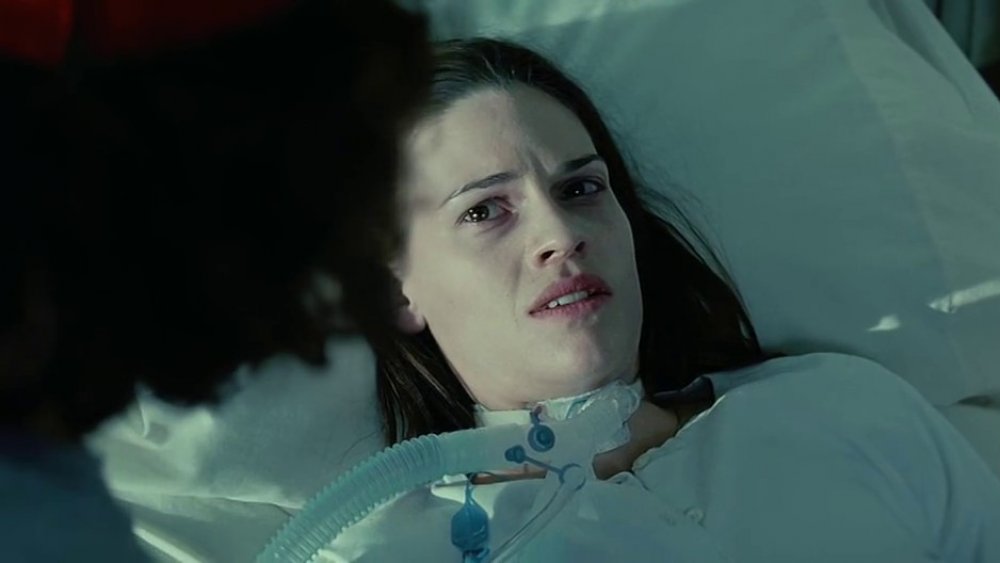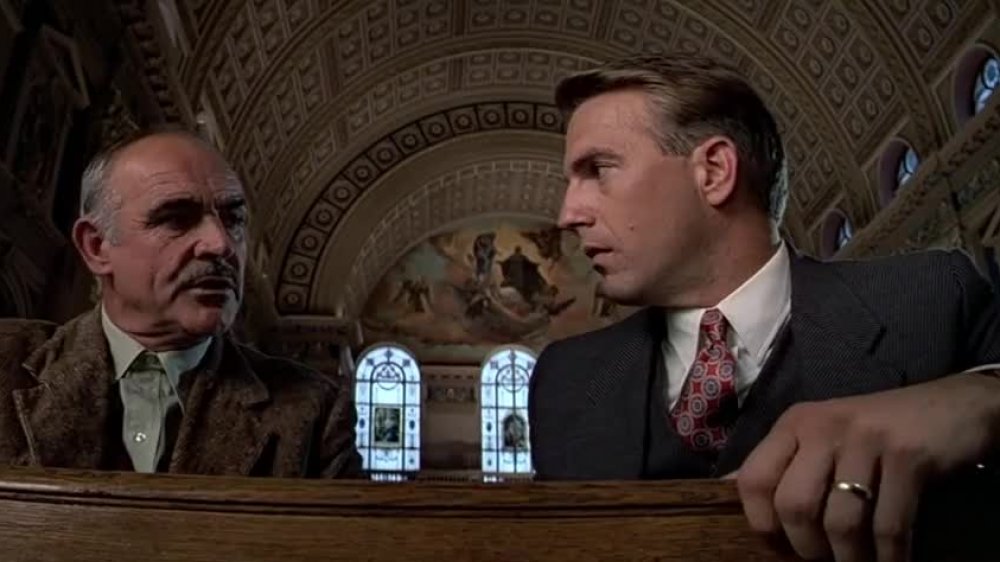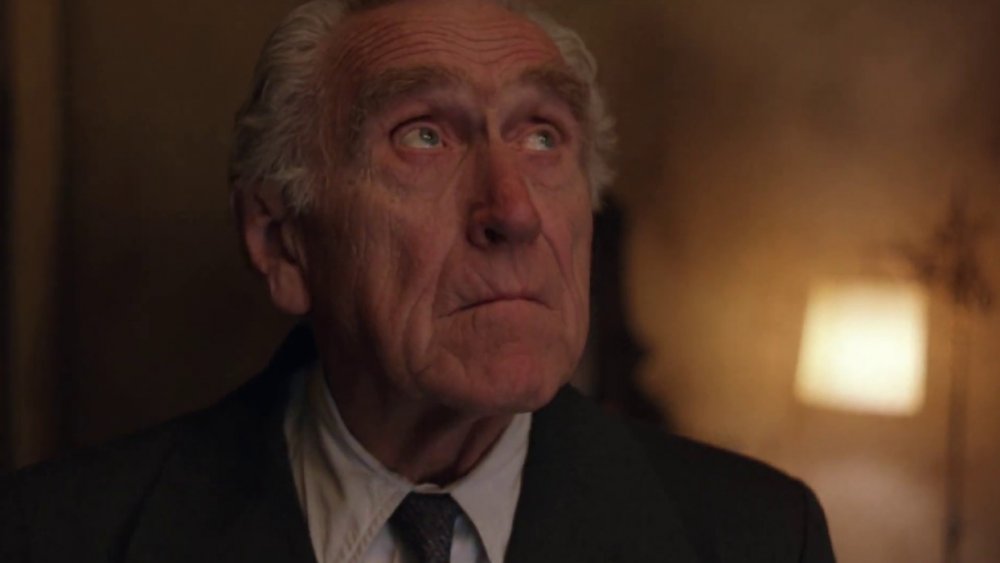The Saddest Movie Deaths We Didn't See Coming
Death, inevitable and endlessly frightening as it is, is portrayed on screen in a litany of different ways. Sometimes, we're totally anticipating a character's death for the whole film, and when it comes, it's 100% conclusive. Other times, it's unexpected and staged for shock humor, leaving us laughing and totally surprised. In other genres, like horror movies and war movies, the fear and randomness associated with death are key to the stories being told. And in The Seventh Seal, death is portrayed as a guy who likes to play chess.
However, in some movies, deaths can be a mixture of both "surprising" and "sad," and those can change the entire feeling of a film. Whether the death alters a film's tone, reveals a new meaning, or forces a protagonist to change before the last act of the film, these tragic stories leave audiences absolutely gutted. From cartoon characters to incredible athletes, these are the saddest movie deaths we didn't see coming.
(Be warned — major spoilers ahead.)
Up shows an entire life in an opening
Sad deaths in a Disney movie are never too big of a surprise for the movie-going public — Disney is the studio that iced Mufasa and Bambi's mom, after all — but Ellie's passing in Up is not only unexpected but also heartbreaking to experience. Up begins with a meet-cute between a young Ellie, daring and outgoing, and a young Carl, reserved and cautiously courageous. After witnessing the pair bond as children over a mutual love of adventure, the audience gets whisked away by Up's Oscar-winning theme song and taken through a montage of the couples' life together.
Composer Michael Giacchino's piano strokes and trumpet horns take viewers through an entire life from highs, like buying a house, to lows, like Ellie learning she can't have children. By the time the couple has reached their twilight years, the audience knows and loves them both. Then, Disney — working with those tear-jerking experts at Pixar — does its thing. Ellie gets sick just before she and Carl finally take their big trip to South America. One animated hospital scene later ... and she's gone. By the time Carl walks up the front steps to their house alone, tears are flowing, and everyone in the theater is rooting for Carl to find happiness again. Also, this is only the opening of the movie.
The good guy gets it in The Departed
Martin Scorsese makes movies about consequences, so in the third act of his films, his characters often find themselves standing in the eye of the storm they created. For example, by the end of Goodfellas, career criminal Henry Hill's life of crime has cost him everything he loved about his life in the Mafia. While it's a harsh reality, it's the ending most audiences feel someone like Henry deserves. But when Leonardo DiCaprio's undercover cop, Billy Costigan, is unceremoniously blown away near the conclusion of Scorsese's The Departed, moviegoers were devastated.
Bill is the good guy. In his final moments, Bill has Matt Damon's crooked detective, Colin Sullivan, caught red-handed, then two elevator doors slide open, a gun fires, and Bill's hopes for a future and audience expectations are snuffed out in a pink mist. After nearly two hours of tense and heavily accented Boston crime drama, Scorsese reveals his own "rat" or "mole" in the role of the protagonist. Bill's good intentions and battle with morality make him appear to be the central character of Scorsese's cop caper, but his late and tragic death reveals whose story the film is actually telling — Collin Sullivan's. In the end of The Departed, Bill is another consequence of Colin's misdeeds. His exit centers the film around Sullivan, and the closing scenes follow Sullivan as he reaps the grotesque seeds he's sown.
Daddy issues in Guardians of the Galaxy Vol. 2
The Guardians of the Galaxy franchise has always focused on familial trauma dressed up as space opera, and the second installment in the franchise is no different. In the film, Chris Pratt's Peter Quill has to confront his real father, Kurt Russell as planet/space god Ego, as well as his adoptive father, Michael Rooker's blue-skinned and mechanically mohawked Yondu. Both fathers are Freudian nightmares. Ego is an ancient god who only conceived Peter to spread his influence across the galaxy, and Yondu kidnapped Peter for money when Peter was a child.
However, after Peter kills his real father in order to save the galaxy from the conquest of Ego — yes, it's that Freudian — Yondu saves Peter's life by sacrificing his own. It's surprising because the whistling space pirate taught Peter everything he knew about self-preservation, but it's also heartbreaking. Rooker and Pratt share real chemistry and easily sell the overdue emotional catharsis in the pair's final moments together. Yondu saves his boy, admits his failings as a father, and dies just as Peter realizes he had the dad he wanted the whole time. Peter's final "no's" as he watches his adoptive father shuffle off this mortal coil leaves the audience as cold as the farthest reaches of space.
The Mist has a depressingly ironic end that we didn't see coming
In 2007's The Mist, a small town is besieged by an interdimensional mist containing carnivorous monsters from what must be the worst corner of the multiverse. Thomas Jane's David Drayton and his eight-year-old son, Nathan Gamble's Billy, try to hold out in a grocery store with a group of other survivors. However, what starts off simple quickly evolves into a meditation on the virtues of hope and hopelessness in dire situations.
Maintaining hope, David gets his son and some other survivors outside to take their chances on the road and drive until the mist ends. Unfortunately, the mist doesn't end, and with no gas and the monsters closing in, David takes the fate of the survivors into his own hands with the group's remaining bullets. After the group suicide is concluded, David is out of bullets, so he gets out of his car to face the Lovecraftian monsters, but then ... the army shows up. Monsters defeated, David and the audience are left to deal with the conclusion's dreadful irony.
To this day audiences are divided on the haunting deaths at the end of The Mist, but director Frank Darabont doesn't care. In a 2016 interview with Yahoo! Entertainment, Darabont admitted he was "feeling a little angry at the world" while making the movie. That may be an understatement considering Darabont presented the ultimate example of hope's power in The Shawshank Redemption barely a decade earlier.
The lie of a lifetime and two of the saddest deaths in cinema
With the use of its romantic tropes, Atonement creates a sense of security for its audience that the film smashes to smithereens with the surprise death of two of its central characters, James McAvoy's Robbie Turner and Keira Knightley's Cecilia Tallis. The film's story revolves around the lie that Robbie attacked a member of the upper-class family he's worked for his entire life. Robbie is in love with highborn Cecilia, but her jealous sister, Saoirse Ronan's Briony, lies about seeing Robbie sexually assault their cousin. The lie destroys their lives, as Cecilia cuts ties with Briony, Briony lives with eternal regret, and Robbie is taken to prison.
Then, World War II begins, and it appears each major character will find redemption by the film's conclusion. Atonement, however, explores the power of fiction, not the power of truth. So, in the final minutes of the film, Briony, now an elderly woman and successful novelist, confesses in an interview that her latest book, in which Cecilia and Robbie are reunited, is fabricated. In reality, she never overcame her guilt, Robbie died at Dunkirk, and Cecilia perished in the Blitz. The late reveal is not only heart-wrenching but also changes the meaning of the movie. Instead of a romantic war epic, the audience has witnessed a deep meditation on the destructive power of lies and the restorative power of fiction.
Morgan Freeman exits off-screen in Unforgiven
Clint Eastwood's revisionist and Oscar-winning Western upend almost every trope of the Western genre by taking the romanticism out of gunplay and showing it for what it is — murder. Eastwood's retired gunslinger, William Munny, and Morgan Freeman's Ned Logan reunite for one last hurrah. Accompanied by a hot-headed young gun, the retired ravagers set off to collect a bounty on some cowpokes who assaulted a prostitute in Big Whiskey, Wyoming.
Ned, Will's longtime partner and best friend, quickly realizes he's lost his taste for killing, tells Will he's leaving, and turns back towards the homestead. Shockingly, and not just because he's Morgan Freeman, Ned never makes it home. Instead, Ned is tortured and killed by Gene Hackman's sadistic Sheriff Little Bill. Ned's death is sad not just because he died only after reconciling with the errors of his ways, but also because his death, or the news of his death (it's off-screen), marks a major tonal shift for the movie.
Upon hearing the news, Will sheds the facade of a decent person he's worn until that point in the film and goes into town as the demon of his past legend. What happens next is one of the quickest and most disturbing gunfights ever to conclude a film, and it's all caused by the sad and surprising death of Will's last real friend, Ned.
A road trip gone wrong in Easy Rider
In 1969, Hollywood royalty Peter Fonda and Hollywood wild man Dennis Hopper made the defining movie of the counterculture movement. Easy Rider's plot is simple. Two motorcycle vagabonds make a killing off a drug deal and head to Mardi Gras, and their road trip evaluates the growing cultural divide present in America following the Summer of Love. Once the pair reach the Deep South, they're met with nothing but scowls and "no occupancy" signs. No one welcomes them, except Jack Nicholson's small-town lawyer, George Hanson.
George, more open-minded than his neighbors, dawns a football helmet and hitches a ride with the duo, feeling free for the first time in his life. Unfortunately, after a few brief scenes together, George is killed in a nighttime raid on the boys' camp. While George is written as a symbol for the ways more traditional American values threatened the counterculture movement, Nicholson brings the character to life in ways no one could've anticipated during his casting. His blend of charm and self-effacing good nature makes him an audience surrogate. The main character's motivations may be abstract, but Nicholson makes the desire to ditch the mundane for the road very real. So instead of his sudden passing playing as a shallow metaphor, it becomes a depressing reminder of where our country was in that moment and the risk inherent to the film's main characters.
Nobody saw Rachel's death coming ... not even Batman
The tragic death of Maggie Gyllenhaal's Rachel Dawes in Christopher Nolan's The Dark Knight surprises everyone, even the film's main character, Christian Bale's Batman. At the end of the second act, the audience is well aware of how dangerous Heath Ledger's Joker really is. He's held the city hostage, murdered officials, and blown up city streets fighting Batman. However, Nolan decides to make the battle between the Joker and Batman personal by offing the Caped Crusader's love interest and childhood friend.
To Nolan's credit, Rachel's death, while shocking, isn't excessive. It's not only a catalyst for Two Face's presence but also the introduction of the movie's exploration of lies. Before her death, Rachel writes a letter to Bruce explaining she can no longer wait for him to stop being Batman and that she plans on marrying Harvey Dent. At the conclusion of the movie, Alfred hides this truth from Bruce to spare him the pain. However, the lie amplifies the tragedy of Rachel's loss because instead of Batman having to come to terms with the effects of his actions on those around him, he continues his fight for a fallacy.
It's heartbreaking, especially considering all Rachel ever wanted from Bruce was for him to be honest with himself. Her death adds to the realistic tone that so many fans loved and made others wish for the days when Joker broke out of prison on a spring.
With such a sad death, this can't be a kids' movie
Coming-of-age films are often centered around children's first experiences with death — think Stand by Me. However, since 1991's My Girl takes place in a mortuary and follows Anna Chlumsky's death-fixated protagonist Vada Sultenfuss, a tragic on-screen death seems out of the cards for the film. Unexpectedly, however, it features one of the most tragic on-screen deaths of all time. Vada's best friend and bearer of her mostly unrequited love, Macauly Kulkin's Thomas J. Sennet, goes into the woods to find a lost mood ring for his crush. Sadly, he stumbles across a beehive, is stung, and succumbs to fatal bee allergies.
His death not only comes out of left field but also sets up a third act for the film that's entirely concerned with his passing. The agony culminates in a gut-wrenching scene at Thomas' funeral. Vada, seeing that Thomas was placed in the coffin without his glasses, has a breakdown and begins telling the funeral-goers, "Thomas can't see without his glasses." By the time she's recalling Thomas' dreams of being an acrobat, her pain leaves the screen and echoes along the walls of whatever theater, living room, or any other place the movie is being shown. The film explores how young people deal with death with an edge of realism as sharp and alarming as a bee sting. It's hard to say if it's really for kids at all.
Million Dollar Baby is one big sucker punch
Clint Eastwood's Million Dollar Baby comes with all the trappings of an underdog sports movie. Old grizzled boxing trainer? Check. Spunky and impoverished boxer — Maggie Fitzgerald, played by Hilary Swank — who no one believes in because she's a girl? Check. However, right before the final uplifting moments, the film stops following a checklist and takes a dark turn. Maggie is sucker-punched during a break between rounds in the world championship and becomes a paraplegic.
Unlike the other deaths on this list, Maggie's passing isn't entirely unexpected. After losing a leg to gangrene, Maggie asks her coach and surrogate father, Eastwood's Frankie Dunn, to help her die. It's awful. However, the set-up of the film and the routine nature of the proceedings until the climax, make her death truly unexpected. Maggie's training not only gave her a shot at the title, but it also gave her the opportunity to connect with a father figure. When Maggie asks Frankie to end her suffering, it elevates the movie into one of the most tear-jerking dramas of the early '00s. Only at the end does the audience realize the movie was never really about sports at all but was really about the way genuine affection can be found where humans least expect it. It sounds cheesy, but this movie stacks its sentimentality with so much anguish that its final lesson lands like a knockout punch.
A criminal death in The Untouchables
Sean Connery earned an Oscar for his outstanding performance as veteran Irish beat cop Jim Malone in 1987's The Untouchables. The movie chronicles the federal unit assigned to the arrest of Al Capone during Prohibition. From the outset of the film, the clean-cut agents are no match for Capone's corrupt grip over the city of Chicago. No match, that is, until James Bond, sorry, Jim Malone, shows up and tells them what's what. Connery, with his rolling accent and indispensable gems of wisdom, steals every scene he's in. So when he's assassinated in his home around the midway point of the film, the audience and the remaining characters feel his loss immensely.
The Untouchables is a highly regarded mob flick, largely due to Connery's performance and Robert De Niro's Al Capone, but a lot of the movie's greatness can be attributed to director Brian De Palma. One of the choices De Palma makes to give the audience a sense of just how daunting it is to bring down Capone is showing his ragtag group of protagonists celebrating their victories. He films them congratulating one another and focuses on the bond the traumatic undertaking forms between the men. The focus on this bond creates a sense of loss in Malone's death that most crime movies miss. In fact, Malone's death plays like the unexpected exit of a trusted mentor and friend.
The Shawshank Redemption's incredibly sad death scene
Until the midpoint of the movie, James Whitmore's Brooks has a minor role in Frank Darabont's masterclass in empathy, The Shawshank Redemption. As the old guy in a group of prisoners, Brooks is largely sidelined in the story of Andy Dufresne's redemption. However, once he's released after 50 years in Shawshank, the movie leaves the titular jail to follow Brooks as he discovers he can't find purpose in the real world, and he eventually hangs himself to escape his new prison.
The entirety of Brooks' life outside of Shawshank is condensed to less than five minutes of screen time, and it's devastating. In every frame, Darabont films Brooks to emphasize his loneliness and inability to understand his new surroundings. The audience watches Brooks feed birds alone, misunderstand how to cross a street when automobiles are present, and fail at being a grocery bagger. Brooks' story ends up being the kind of sad most audiences go to movies to avoid altogether, but it's a brilliant vignette in one of the best movies ever made. By the time Brooks climbs up to the rafters to prepare for his exit and carves "Brooks was here" into the beam he plans to hang himself from, audiences everywhere knew they weren't forgetting those words anytime soon.
If you or anyone you know is having suicidal thoughts, please call the National Suicide Prevention Lifeline at 1-800-273-TALK (8255).
